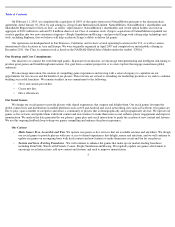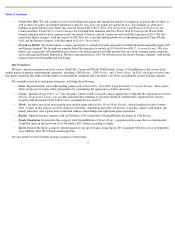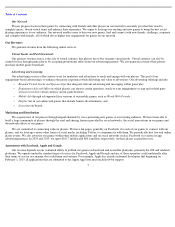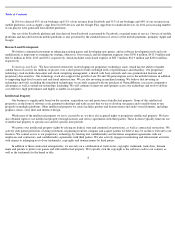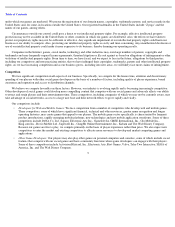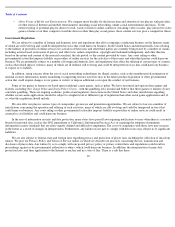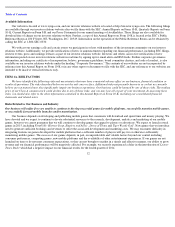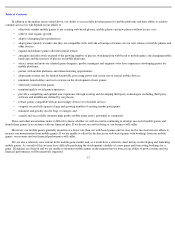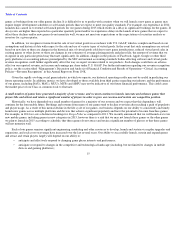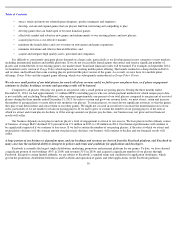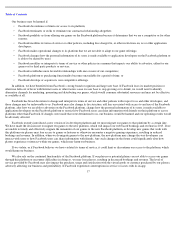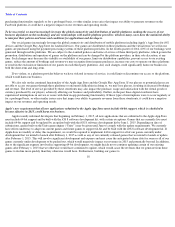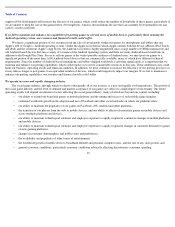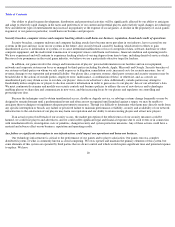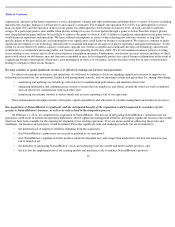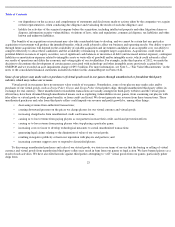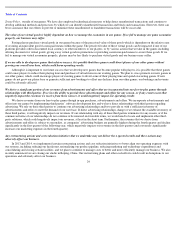Zynga 2014 Annual Report Download - page 18
Download and view the complete annual report
Please find page 18 of the 2014 Zynga annual report below. You can navigate through the pages in the report by either clicking on the pages listed below, or by using the keyword search tool below to find specific information within the annual report.
Table of Contents
games as bookings from our older games decline. It is difficult for us to predict with certainty when we will launch a new game as games may
require longer development schedules or soft launch periods than we expect to meet our quality standards. For example, our experience in 2014
launches has caused us to extend soft launch periods for our games during 2015 which results in a delay in significant bookings for the games. If
decay rates are higher than expected in a particular quarterly period and/or we experience delays in the launch of new games that we expect to
offset these declines and/or new games do not monetize well, we may not meet our expectations or the expectations of securities analysts or
investors for a given quarter.
In addition, we recognize revenue from the sale of our virtual goods in accordance with U.S. GAAP, which is complex and based on our
assumptions and historical data with respect to the sale and use of various types of virtual goods. In the event that such assumptions are revised
based on new data or there are changes in the historical mix of virtual goods sold due to new game introductions, reduced virtual good sales in
existing games or other factors or there are changes in our estimates of average playing periods and player life, the amount of revenue that we
recognize in any particular period may fluctuate significantly. In addition, changes in the policies of Facebook, Apple, Google or other third
party platforms or accounting policies promulgated by the SEC and national accounting standards bodies affecting software and virtual goods
revenue recognition could further significantly affect the way we report revenue related to our products. Such changes could have an adverse
effect on our reported revenue, net income and earnings per share under U.S. GAAP. For further information regarding our revenue recognition
policy, see the section titled “Management’s Discussion and Analysis of Financial Condition and Results of Operations—Critical Accounting
Policies—Revenue Recognition” in this Annual Report on Form 10-K.
Given the rapidly evolving social game industry in which we operate, our historical operating results may not be useful in predicting our
future operating results. In addition, metrics we have developed or those available from third parties regarding our industry and the performance
of our games, including DAUs, MAUs, MUUs, MUPs and ABPU may not be indicative of our future financial performance. This could cause
the market price of our Class A common stock to fluctuate.
A small number of games have generated a majority of our revenue, and we must continue to launch, innovate and enhance games that
players like and attract and retain a significant number of players in order to grow our revenue and sustain our competitive position.
Historically, we have depended on a small number of games for a majority of our revenue and we expect that this dependency will
continue for the foreseeable future. Bookings and revenue from many of our games tend to decline over time after reaching a peak of popularity
and player usage. As a result of this natural decline in the life cycle of our games, our business depends on our ability to consistently and timely
launch new games across multiple platforms and devices that achieve significant popularity and have the potential to become franchise games.
For example, in 2014 we saw a decline in bookings for Zynga Poker as compared to 2013. We recently announced that we will launch six to ten
new mobile games, including games in new categories in 2015, however there is a risk that we may not launch these games or the other games
we plan to launch in 2015 according to schedule, that these games do not attract and retain a significant number of players or that these games
will not monetize well.
Each of our games requires significant engineering, marketing and other resources to develop, launch and sustain via regular upgrades and
expansions, and such costs on average have increased over the last several years. Our ability to successfully launch, sustain and expand games
and attract and retain players largely will depend on our ability to:
15
•
anticipate and effectively respond to changing game player interests and preferences;
•
anticipate or respond to changes in the competitive and technological landscape (including, but not limited to changes in mobile
devices and gaming platforms);


